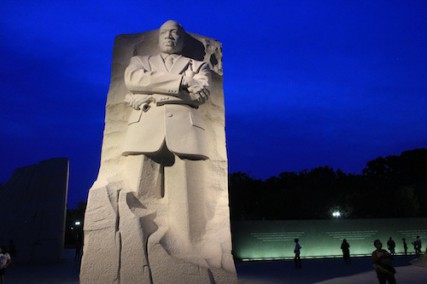
Our featured dialogue this week comes from an article written by guest columnist Matthew S. Rindge.
In his post, “Stop celebrating Martin Luther King Jr.” he writes that racial equality shouldn't be King's only legacy.
Rindge writes:
Remembering King primarily for his struggle against segregation is to misremember him. (America does with King what the Church has done to Jesus: remade him in our own image.) Domesticating and sterilizing King is the only way to integrate him into our national consciousness. The unlikely alternative would be to question two of America’s sacred engines: its economy and military. Ironically, King’s critiques of poverty and militarism are more relevant today than his work on behalf of racial integration.
To honor King, we need to stop celebrating him. Perhaps the very nature of celebration makes distortion inevitable. A National Day of Lamenting King would be more fitting, and helpful in calling to mind the ways we betray two fundamental aspects of his legacy.
The comments began flowing immediately. Some praising this post, others criticizing it.
D West appreciated the article saying, “For far too long have we bypassed 2 of the 3 evil’s that King rallied against. Our economy has only grown in its disparity between the rich and the poor. And our recent use of drones and other military tactics that harm civilians is as troubling as ever. Keep speaking out!.”
Others, like Charlie Ebb, didn't appreciate the post as much, “What?? Because YOU think that Dr King is only remembered for his work toward racial equality, your answer is to remove the remembrance rather than to expand the education to include celebrating his work in other areas like poverty and passive resistance, etc…”
Part of our mission is to spark dialogue in this community about faith and ethics. This dialogue, we believe, can lead to changed minds, better understanding, an increase in interfaith work and a more tolerant community.







I felt like the author’s point was sound (that there is more to social bondage than racism) but… I dunno, I think using Dr. King to make this point was a little questionable. There are other figures out there who have been fighting the same fight and don’t make it necessary to throw shade on Dr. King’s work in racial reconciliation, for which he paid the ultimate price.
Sam – Devoting himself to the issues of war and poverty in the last years of his life seems, to me, to have had a great deal with King’s death.